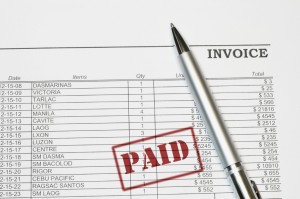Cash is King: 10 Credit Control Tips for Small Businesses
Cash flow is the lifeblood of any business, but for small businesses it’s even more important. Why? Because it can be the deciding factor in the success of your business – or its failure. You have your own bills and expenses to pay each month, so bad- or non- payers can tip the balance and mean that the money flowing out of your business far outweighs the money that comes in.
So, how do you make sure that your cash flow remains strong, while keeping your relationships with your clients/customers healthy? Check out my credit control tips for small businesses to find out.
Tips for Opening Trade Credit Accounts
- Credit check trade customers
There are a number of credit reference agencies that offer you the ability to credit check your customers, such as Dun & Bradstreet and Experian, and the information they provide lets you make a considered decision as to whether your customers are credit-worthy, or not.
- Use credit application forms
Make sure that any customers who are looking for a credit account complete a full credit application form, which should involve them signing to agree with your terms and conditions, such as payment terms. Having a signed agreement can make all the difference if the worst happens and you have to go to court to collect a debt.
Tips for Managing Credit Accounts
- Send invoices straight away
If you’re not sending out your invoices in a timely manner, can you really blame your customers for not paying on time? If your customers receive their invoices when your business is fresh in their mind, they’re more likely to start the payment process straight away.
- Send monthly statements
Sending monthly statements is one of the key credit control tips for small businesses. Every customer who owes you money should receive a monthly statement of account that shows them exactly what’s due and overdue. You know when you get your monthly credit card statement, and it reminds you to make a payment? Same thing applies here!
- Monitor and manage credit limits
Just because you’ve set a specific credit limit for a customer, it doesn’t have to be set in stone until the end of time. If you monitor credit limits regularly, you might find that some customers don’t need as much credit as they did initially, while others might need higher credit limits to support their orders.
- Pre-chase payments
Just before payment time, pick up the phone to your customers, or drop them a quick email, just to make sure that they’re going to be making the payment. This is also a good time to make sure that there aren’t any queries with your invoices, and avoid any nasty surprises!
Tips for Managing Problem Payers
- Have a system for overdue debts
Find a system that works for you, and stick to it. An example might be a phone call once an invoice becomes overdue, followed by a letter after 7 days and another after 14 days. However you decide to chase up overdue invoices, it’s important to do it every time, for every customer. Late payers will soon realise what’s in store if they don’t pay, and are more likely to make your payments a priority.
- Keep in regular contact
Once you’ve started a dialogue with a late payer about when you can expect your money, keep picking up the phone to check the progress of their payment. Now, I’m not saying that they’ll pay quicker just to avoid you bugging them all the time . . . but let’s just say you’ll see results.
- Be polite but firm
You obviously don’t want to alienate your customers, so don’t start ranting and raving at them if they’re a day late making payment. At the same time though, you need to be firm and persistent. I know some people don’t like having to chase for payment, and feel that they’re being harsh, but I promise you that your customers are likely to be having the same conversations with their late paying customers. However well you get on with your customers; never forget that it’s first and foremost a business relationship.
- Know your options if you’re not getting anywhere
I’m sure you’ve had at least one customer who gives you all the excuses in the world as to why they haven’t paid you. They haven’t received your invoice, they’ve been on holiday, their payment system is down, the dog ate their chequebook, and so on. When it gets to the point that you know you’re not going to be paid any time soon, it’s essential that you know your options. If you’re considering taking legal action to get your money, make sure that you know exactly what you need to do, and how much it’s going to cost you.
So these are my credit control tips for small businesses, do you have any that you’ve found useful in the past?

 emily
emily  June 29, 2014
June 29, 2014


 Tags:
Tags: